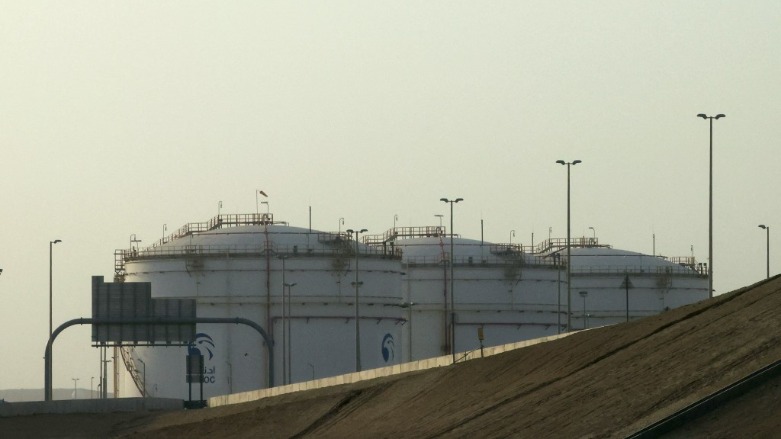Houthi strike on UAE kills 3; KRG joins UAE’s Arab allies in condemning attack

WASHINGTON DC (Kurdistan 24) – The capital of the United Arab Emirates (UAE) was hit by drone strikes on Monday, while Iranian-backed Houthi rebels in Yemen claimed credit for an assault “deep” in the UAE.
The attack on an industrial site killed three people and wounded another six, after it caused three fuel trucks to explode and sparked a fire near Abu Dhabi international airport.
Abu Dhabi is the political capital, while Dubai is its commercial hub.
The Houthis have previously launched similar assaults on Saudi Arabia, which along with the UAE, backs rival forces to the Houthis in Yemen. However, this was the first time such a target has been attacked in the UAE.
Yemen’s civil war—essentially a proxy war between Riyadh and Tehran—followed the overthrow of Ali Abdullah Saleh in February 2012. Subsequently, the country became one more failed “Arab Spring” state, despite Western expectations that the overthrow of Arab dictatorships would radically transform the region.
Arab Allies, KRG Condemn Attack, while UAE vows Retaliation
Following the attack, the UAE immediately received statements of support from its Arab allies, including Saudi Arabia, Bahrain, and Kuwait in the Gulf, as well as Egypt, further afield, while the Prime Minister of the Kurdistan Region, Masrour Barzani, tweeted his “strong” condemnation of “the heinous terror attack” and his sympathies with the injured and families of those who were killed.
I strongly condemn today’s heinous terror attack on Abu Dhabi. This dangerous escalation is part of a pattern to destabilize the region.
— Masrour Barzani (@masrour_barzani) January 17, 2022
My thoughts are with the injured and the families of those lost. The Kurdistan Region stands with the people and government of the UAE -mb.
Egypt’s Foreign Minister, Sameh Shoukry, spoke by telephone with the Emirati Foreign Minister, Abdullah bin Zayed Al Nahyan, a statement from the Egyptian Foreign Ministry said, as it explained that Shoukry had voiced his country’s “solidarity” with the UAE, while condemning the attack and expressing his condolences.
“Saudi Arabia, Kuwait, and Bahrain,” for their part, “quickly condemned what they described as a ‘terrorist act’” and “blamed Yemen’s Iran-backed Houthis,” Dubai-based Al-Arabiya reported.
The UAE Foreign Ministry, for its part, condemned the attack on “civilian facilities” and vowed that it “will not go unpunished.”
Attacks in Iraq as Precedent?
Monday’s drone attack on Abu Dhabi follows a series of similar assaults on targets in Iraq—both at sites where the US-led anti-ISIS Coalition is located and at sites that are entirely Iraqi and there is no Coalition presence.
The second anniversary of the Jan. 3 US assassination of Gen. Qasim Soleimani seemed to trigger an uptick in such assaults. However, the US response has been extremely limited ,and it has failed to deter further strikes, as Kurdistan 24 reported earlier this month.
Read More: Attacks on Coalition forces continue, as very limited US retaliatory strike failed at deterrence
These assaults were, most evidently, carried out by Iranian-backed militias. Yet the Biden administration would not even say that until a week later. At that point, the US appeared to have intelligence suggesting that Tehran might be planning to assassinate some Trump administration official, in retaliation for Soleimani’s killing.
Then National Security Adviser Jake Sullivan finally stated the obvious, attributing the attacks to Iranian-backed militias, while warning Tehran that the US “will protect and defend its citizens,” regardless of any “disagreements on politics” or “on Iran policy,”
Read More: White House warns Iran; finally says Iran proxies behind attacks on US troops
Sullivan’s statement marked a somewhat bolder US approach in confronting Iran. It threatened a very serious response if Iran did kill a former US official. It also attributed the strikes in Iraq to Iranian proxies.
Nonetheless, it still fell short: it implied that while the Biden administration was prepared to defend US citizens, it was still prepared to accept strikes on Coalition and Iraqi targets.
Thus, one might ask: Should there be any surprise that such strikes have continued in Iraq? Or that they expanded into new areas, like Abu Dhabi?
